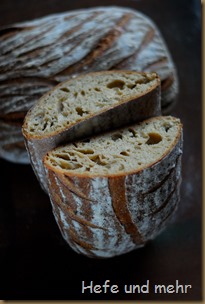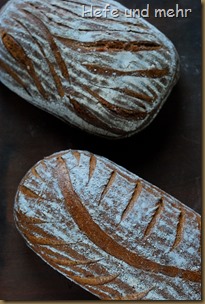
Old grain species like Einkorn, Emmer and Kamut enrich the diversity of bread flavours and gives us a lot of new possibilities for baking. When I thought about a theme for the ongoing Bread Baking Day I realized that I did not bake with these grains for a long time. And so I bought Emmer, Einkorn and Kamut on my next trip to the whole food shop.
Kamut is the trade name of the Khorasan wheat. As a genetical analysis from 2006 showed that its origin lies in the fertile crescent and that it stems from a natural cross between durum wheat and Triticum polonicum. Its flour has, similar to durum flour, a creamy yellow colour and can be used similar to wheat flour.
Because kamut is rather expensivI normally mix wheat flour with kamut flour, and so I did in the bread, too. The honey I added to the dough pairs very well with the mild yoghurt flavour of my very active sourdough and the nutty nuance from the Kamut. The honey although enhance the dark crust colour while some stretch and fold cycles helps to create an open crumb.
Honey bread with Kamut
yields 2 breads
Sourdough
- 200g flour Type 550
- 200g Water
- 20g very active sourdough starter
Dough
- 300g Kamut, freshly milled
- 500g flour Type 550
- 500g Water
- sourdough
- 60g honey
- 20g Salt
- (optional 5g fresh yeast, if your starter is not so active)
Mix water, flour and starter for the sourdough and ferment it for 12 to 16 hours at 25°C.
Mix flour and water for the dough. Let it rest for 30 min, then add honey, sourdough and salt. Fold it from the outside of bowl into the middle for 5 min.
Let rise for 2 hours, stretch and fold three times during this time.
Shape the dough into two loaves, place them in well floured breadforms seamside up.
Proof for 2 hours.
In the meantime preheat the baking stone to 250°C.
Slash the loaves directly before baking.Bake for 10 min at 250°C then reduce to 200°C for 40min with steam on a hot stone.
I sent this entry to Yeastspotting, Susans weekly showcase of yeast baked good.
Deutsch



Kleiner Tip am Rande – nehmt Khorasan Mehl .. ist meist günstiger als Kamut, ist aber das selbige … – “Kamut” ist nur ein Vermarktungsgag sozusagen … für den Kamutsamen wird in den USA Lizenzgebühr verlangt … für Khorasan nicht. – Das Getreide ist 1:1 das selbige.
Bei dem Kamut-Anteil handelt es sich also um Kamut-Vollkornmehl und nicht um das im Handel erhältliche gemahlene Kamutmehl “hell”?
Ich habe Angst, dass ich mit dem Wasserverhältnis dann falsch liege.
Herzliche Grüße
@Andy:Genau, es handelt sich um Vollkornmehl!
Ich muss doch auch mal mit Kamut backen, dein Brot sieht zum Anbeißen aus! Im Bioladen ist er nur immer so unglaublich teuer…Liebe Grüße Melanie
Hübsche Streifung hat dein Brot und dann die netten Löcher!
Hast du Dan Sadowski’s und Barbara Elisi’s Posts “The Hole Truth” und “The Holey Bread That Fed Generations” gelesen? – sehr interessant und äusserst unterhaltsam: http://www.myitaliansmorgasbord.com/
LG, Karin
Guten Morgen Stefanie, ein wunderschönes Brot, ich finde Kamut auch ganz toll, ist irgendwie nussig und hier stehen noch knapp 2kg Kamut VKM rum, die verbraucht werden wollen, da das MHD näher rückt 🙂 Hab auch Deine Vollkornkekse – also die mit Dinkel und Hafer bereits sehr erfolgreich damit gebacken, die sind hier der Renner 😉 Schönen Sonntag wünsche ich Dir. Herzlichst Nadja